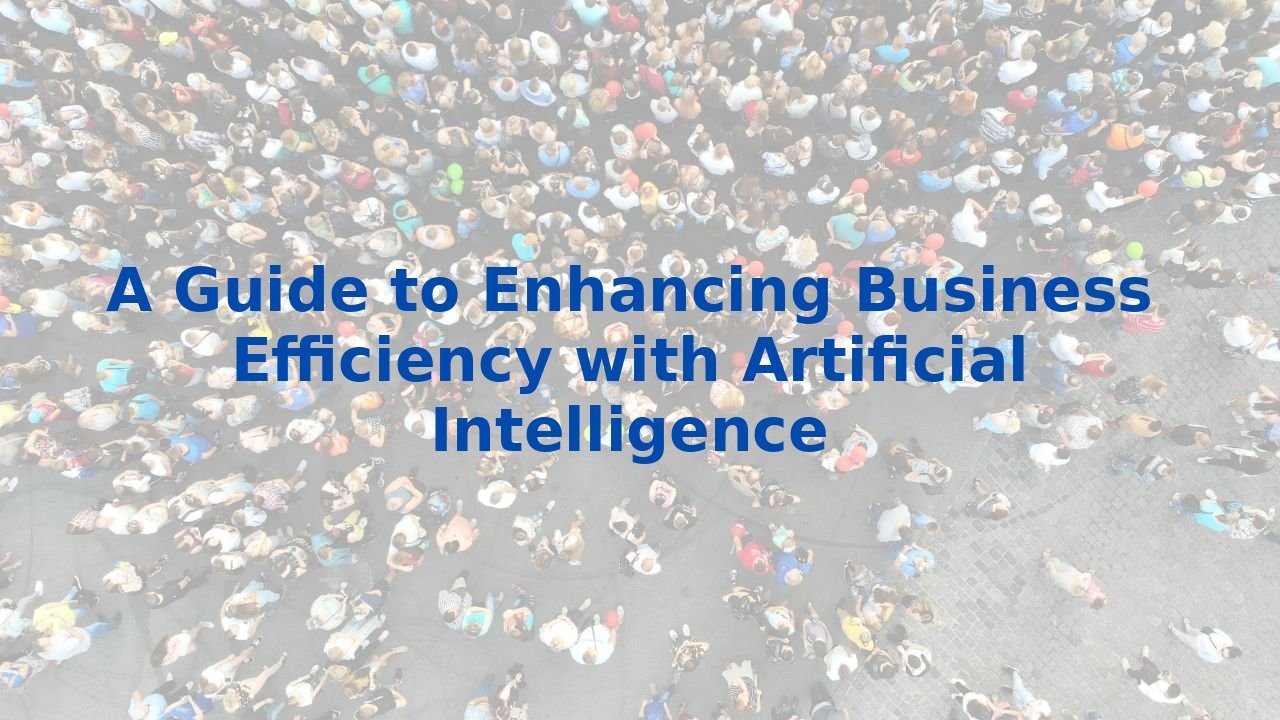A Guide to Enhancing Business Efficiency with Artificial Intelligence
A Guide to Enhancing Business Efficiency with Artificial Intelligence
In today’s competitive landscape, organizations are constantly on the lookout for innovative ways to improve efficiency and drive growth. Artificial intelligence (AI) stands at the forefront of this transformation, offering unique solutions that streamline processes, enhance decision-making, and ultimately, elevate the bottom line. Let’s explore how AI can enhance specific business processes and the profound benefits it brings to organizations.
Improving Meetings and Communication
Meetings can often feel like a drain on productivity, burdened by administrative tasks that detract from their core purpose. Imagine a scenario where scheduling is automated and key highlights from meetings are captured without deviation. AI voice assistants facilitate appointment scheduling seamlessly, while sophisticated tools can listen in, convert dialogues into actionable insights, and summarize key points. This shift not only saves time but ensures that focus remains on crucial discussions, fostering a more engaged and effective workforce.
Enhancing Sales and Marketing
The realm of sales and marketing is particularly ripe for AI integration. Through advanced analytics, AI can reveal invaluable insights regarding customer behavior, helping sales teams identify high-value leads and opportunities. Furthermore, AI-powered chatbots are revolutionizing customer interaction by offering immediate responses, guiding prospects through the sales funnel, and improving overall customer satisfaction. This strategic focus on efficiency naturally leads to increased revenues and sustained audience growth.
Assessing and Improving Customer Service
Customer service stands as a bastion of business efficiency, directly impacting brand loyalty and retention rates. By leveraging AI, organizations can automatically gauge the quality of service through customer interactions. Machine learning algorithms can analyze previously recorded customer service calls, identifying areas of improvement with precision. This technology not only empowers companies to rectify service flaws but also enhances the customer experience exponentially. When customers feel valued and understood, they stay engaged.
Improving Product Development Processes
Innovation is the lifeblood of any thriving organization, and AI substantially accelerates product development. Generative design software employs AI to explore an entire spectrum of viable design options. By analyzing specific parameters and requirements, it can decrease the need for costly prototypes that may not yield results. This technique streamlines the development phase, enabling companies to bring products to market faster, more efficiently, and with greater confidence in customer satisfaction.
Automating Content Generation
Content is king in the digital realm, and creating it can be a laborious process. However, AI is changing the game by generating high-quality content in mere seconds—from product descriptions to detailed industry reports. This capability drastically reduces the workload on marketing teams, allowing them to focus their creativity on strategy and engagement while leaning on AI for volume and consistency. With AI as a partner, the dual objectives of quality and quantity become more attainable than ever.
Streamlining HR Processes
Human Resources (HR) management often feels cumbersome, with recruitment and onboarding processes taking significant time and resources. AI can streamline these tasks by automating candidate assessments, narrowing down applicants, and ensuring that only the most qualified individuals progress through the hiring pipeline. This not only speeds up recruitment but also fosters a more objective and effective selection process, ultimately enriching company culture and productivity.
Optimizing Business Processes with AI
Beyond individual functions, AI brings a synergistic approach to overall business process optimization. Its capacity to analyze and automate data can yield transformative insights and predictions. Organizations can build workflows that mirror best practices, and real-time monitoring ensures that deviations are addressed swiftly, minimizing potential risks. This proactive culture of efficiency underpinned by data analysis equates to reduced operational costs and heightened employee performance.
The Value of Training Employees for AI
While integrating AI tools is vital, equally important is empowering employees through training. When staff are equipped with AI competencies, they can fully leverage its capabilities, enhancing overall productivity. Training leads to:
- Enhanced Productivity: Employees become adept at navigating AI tools, allowing for seamless automation of previously time-consuming tasks.
- Improved Decision-Making: Understanding AI-driven insights allows employees to make data-informed decisions that align with business objectives.
- Adaptability: With familiarity in AI applications, teams can more readily adapt to evolving technologies and methodologies.
- Objective Judgments: Human interpretation remains essential. Training ensures that employees can blend AI insights with a human touch for well-rounded decision-making.
Conclusion
AI presents unprecedented opportunities for enhancing business efficiency and innovation. From reimagining meetings to revolutionizing product development and customer service, its applications are vast and impactful. When combined with comprehensive employee training, organizations position themselves not just to keep pace with change but to lead it. As businesses navigate this evolving landscape, embracing AI will be a cornerstone strategy for sustaining competitiveness and unlocking future growth potential.
For a deeper dive into effective AI training strategies, feel free to explore more insights on our AI Learning Blog.



